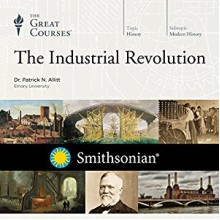Explore the Industrial Revolution with The Great Courses We owe so much of our world to the Industrial Revolution. The lights that illuminate our homes, the cars that carry us to work, the computers that help drive our economy, and the appliances that make our lives easier—these technologies...
show more
Explore the Industrial Revolution with The Great Courses
We owe so much of our world to the Industrial Revolution. The lights that illuminate our homes, the cars that carry us to work, the computers that help drive our economy, and the appliances that make our lives easier—these technologies exist thanks to a remarkable group of scientists and entrepreneurs who, over the past 250 years, have transformed virtually every aspect of our lives and fueled one of the greatest periods of innovation in history.
You would have to look back to the Neolithic Revolution (the invention of agriculture) to find a comparable era when a new set of processes completely overwrote the old one. What happened to allow for such a transformation? How did governments, businesses, and ordinary laborers—beginning in 18th-century Britain—create the forces that completely upended modern society? And how are the innovations and processes of industry still at work transforming the world today?
In The Industrial Revolution, The Great Courses partners with the Smithsonian—one of the world’s most storied and exceptional educational institutions—to answer these questions and more. Taught by longtime Great Courses favorite professor Patrick N. Allitt of Emory University, this course is a fascinating examination of one of the most pivotal eras in history. Over the course of 36 thought-provoking lectures, you’ll explore the extraordinary events of this period; meet the inventors, businessmen, and workers responsible for these new technologies and processes; and uncover the far-reaching impact of this incredible revolution.
We recognize the benefits of the Industrial Revolution in hindsight, but we should not forget that it created numerous hardships along the way. Its method of creative destruction shattered the livelihoods of rank-and-file workers; the new economy increased inequality and often exploited workers; and it was environmentally harmful. While Professor Allitt presents all sides of the story, he shows how the ultimate effect of industrial ingenuity has been overwhelmingly beneficial—and how the fruits of this revolution liberated people from many of the difficulties and restrictions of preindustrial life.
From the humble engineers who helped build the machines and standardize the tools that powered the Industrial Revolution to the outsized personalities of businessmen such as Thomas Edison, John D. Rockefeller, Andrew Carnegie, and Henry Ford, and to the laborers and union leaders who challenged them, The Industrial Revolution presents a comprehensive—and complex—portrait of an exciting era; an era whose story is still being written throughout the world.
show less

